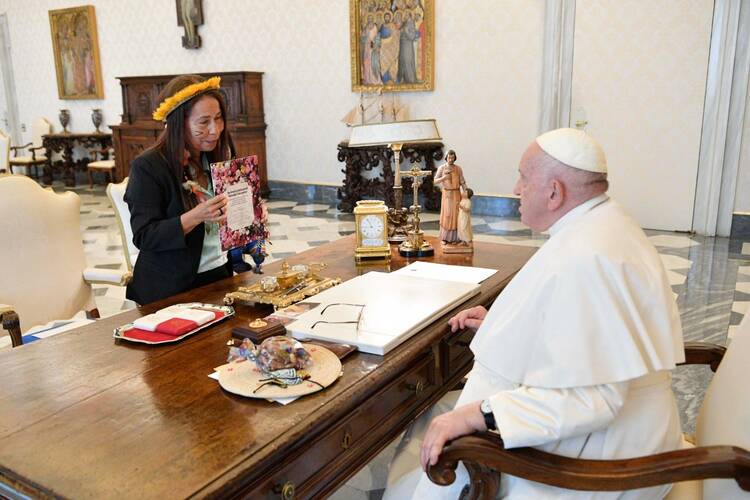A nun makes the case for women deacons to Pope Francis
In early June, Pope Francis received three Indigenous women leaders from the Ecclesial Conference of the Amazon (CEAMA), an innovative form of church governance in which the bishops of the Amazon share formal leadership with Indigenous lay women, women religious, lay men, priests and deacons. During the audience, the women invited the pope to consider the full and equal participation of women in the church, including through preaching in parish settings and ordination as deacons.
One of the women who attended the audience with Pope Francis was Laura Vicuña Pereira Manso, C.F. Sister Laura is currently serving as the vice president for CEAMA, a historic leadership role within a body that has steadily called upon the pope to more deeply consider the ministerial roles of women in the church since the Synod of Bishops on the Pan-Amazonian Region in 2019. (The final document of that synod called for greater leadership roles for women but stopped short of calling for the ordination of women to the diaconate.)
As someone who is working to foster a conversation based in discernment around women in the diaconate, I value the wisdom and experience of CEAMA and Sister Laura. I had the opportunity to travel a shared camino with her to seek the intercession of Our Lady of Gudalupe in Mexico City in September 2022, the liminal time between the conclusion of the listening phase of the synodal process and anticipation of the report from Rome that would synthesize what millions around the world had shared and heard. We both felt drawn to seek the intercession of the Guadalupe, Mother of the Americas, as our church discerns new pathways to more fully receive the gifts of women for ministry and leadership.
During the audience, the women invited the pope to consider the full and equal participation of women in the church, including through preaching in parish settings and ordination as deacons.
Sister Laura’s preaching on our pilgrimage opened up our days of prayer and synodal encounter. In one memorable reflection, she said:
A diaconate of women will be fully understood and practiced in the service of an integral and inculturated evangelization. As presented in the Gospel (Lk 4:38-44) with the service of Peter’s mother-in-law, she was freed from invisibility and became a protagonist in the service of women…. In the new church and in the new society it is necessary to make visible and recognize the service that we women already provide.
This past week, Sister Laura had an opportunity to present our shared hope for a church that would make women’s diaconalgifts more visible when she met with the Holy Father.
Following the audience, Sister Laura sent me a brief missive: “I gave Pope Francis our report about the experience in Guadalupe. I told him that women from the Amazon and North America are making this path of discernment for the ministry of women in the church and [about] the need to advance in recognizing the diaconal service that we provide to the church.”
The service we provide. Not the service we could provide, the service we are already providing. The vast majority of permanent deacons live and minister in the Global North. But at the recent Amazon Synod, the leaders of the church in the region—both bishops and lay leaders—were very clear that it is women in the Amazon who are doing the work of deacons, and it is the desire and hope of that ecclesial community to recognize these women as deacons, ready and worthy to receive the sacrament of ordination.
This past week, Sister Laura had an opportunity to present our shared hope for a church that would make women’s diaconal gifts more visible when she met with the Holy Father.
Like Sister Laura, I co-lead a national network of men and women who are inviting the Catholic Church to recognize, support and deepen the understanding of the ministerial roles of women who contribute to the pastoral mission of the church. We have learned much from one another in the months since our shared pilgrimage, studying the theology of the diaconate and the admission of women to the diaconate; advocating for the presence of women at decision-making tables and in ecclesial spaces; serving the ongoing conversion process of becoming a listening church.
We have focused on the ministry of the diaconate largely because the diaconate itself is a ministry of bridge-building by means of listening and creative response. Deacons are called to pay particular attention to those on the peripheries—those left out of the distribution of bread—to recognize that no one is in God’s blind spot.
A shortage of priests, resources and skill sets for effective ministry have already burdened many local churches. Many Catholic parishes have had to merge or close in response to these pressures. However, in some places, like the Pan-Amazonian region, it is common for bishops to delegate women to preside at baptisms and marriages. We know that Catholic women around the world are regularly preaching the Word, serving as chaplains in hospitals and prisons, leading parishes and social service organizations and engaging in a variety of works of mercy and justice.


No comments:
Post a Comment